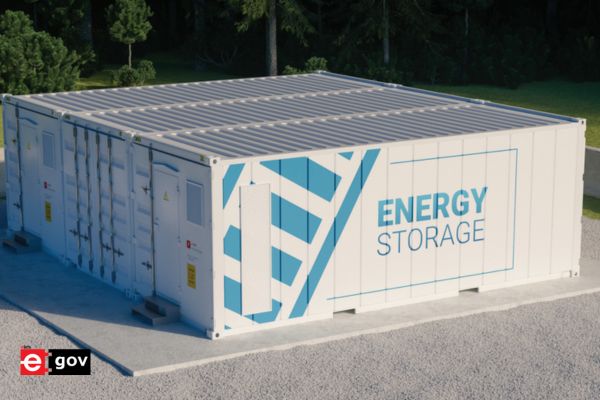
As Gujarat looks towards a sustainable future, the Union Cabinet’s approval of the Viability Gap Funding (VGF) scheme comes as a significant milestone. This initiative is not just a leap in India’s energy policy but a transformative moment for Gujarat, which has been pioneering in harnessing solar and wind energy. With an ambitious outlay of Rs 9,400 crore, this scheme promises to address one of the most pressing challenges in the renewable sector: energy storage. For Gujarat, a state with vast renewable resources, this move unlocks the potential for more efficient use of its wind and solar power.
This groundbreaking scheme, pivotal in fortifying the nation’s renewable energy sector through a robust storage system, resonates strongly with Gujarat’s progressive energy vision. The state, already a leader in solar power generation, can now envisage a future where excess energy is not wasted but stored and utilized effectively. The development of 4,000 MWh of Battery Energy Storage Systems (BESS) by fiscal year 2031 under this scheme is a gamechanger, promising to enhance Gujarat’s energy security and sustainability. In a pivotal moment that reshaped the trajectory of India’s energy landscape, the Union Cabinet approved a groundbreaking scheme aimed at fortifying the nation’s renewable energy sector. This visionary initiative, backed by viability gap funding (VGF), unfolded as a strategic response to the imperative need for a robust storage system capable of harnessing excess wind and solar power.
With an initial outlay of Rs 9,400 crore, including substantial budgetary support of Rs 3,760 crore, the scheme charted a course for the future of renewable energy storage. The VGF, disbursed over three years from fiscal year 2024 to fiscal year 2026, was capped at 40 per cent of the capital cost. This foresighted investment propelled the development of 4,000 megawatt hours (MWh) of Battery Energy Storage System (BESS) projects by the fiscal year 2031.

The selection of BESS developers eligible for VGF grants unfolded through a rigorous competitive bidding process, fostering healthy competition and innovation. Public and private sector entities actively participated, ensuring a transparent and merit-based allocation of funds for the development of energy storage projects.
In recent years, Gujarat has made significant strides in renewable energy. As of 2023, the state boasted a remarkable capacity of over 10 GW in solar energy, making it a national leader in solar power generation. Additionally, Gujarat has been proactive in implementing green initiatives, such as the Suryashakti Kisan Yojana (SKY), which empowers farmers to generate solar power and sell surplus energy back to the grid. This not only boosts their income but also contributes to the state’s renewable energy goals.

Furthermore, Gujarat’s recent push towards wind energy complements its solar achievements. With an installed capacity of over 7 GW in wind energy, the state is harnessing its coastal wind potential to further diversify its renewable energy portfolio. These initiatives, coupled with the new VGF scheme, position Gujarat not just as a participant but as a leader in India’s renewable energy storage revolution. This comprehensive approach to renewable energy, integrating both generation and storage, sets a precedent for other states and highlights Gujarat’s commitment to a sustainable energy future.
During a media briefing on the cabinet’s decisions, Anurag Thakur, Union Minister for Information & Broadcasting, underscored the imperative of storing excess renewable energy. He explained, “If the production of electricity is more than the demand, then how do you store that, since we presently don’t have such facilities in the country? Therefore, we introduced this scheme to develop capacities to store excess renewable energy produced in energy storage systems.
The Minister emphasized the effective utilization of stored energy to bridge supply gaps during peak hours, providing a viable solution to the challenge of intermittent energy production. He highlighted the dual benefits of reducing carbon emissions and decreasing the country’s reliance on fossil fuels, marking a significant achievement in the pursuit of a sustainable energy future.
Beyond its role in enhancing renewable energy integration into the electricity grid, the scheme aimed to minimize wastage while optimizing the utilization of transmission networks. This strategic approach not only obviated the need for costly infrastructure upgrades but also ensured that consumers of distribution companies were among the primary beneficiaries.
The Minister elaborated on this aspect, stating, “An important aspect of the scheme is that consumers of distribution companies will be among its first beneficiaries. Companies availing VGF for setting up BESS infrastructure are required to give 85 per cent of the power to distribution companies. The rest can then be shared with other consumers.
For the state of Gujarat, the VGF scheme is more than just a policy; it is a roadmap towards a greener, more sustainable future. As the state continues to play a critical role in India’s renewable energy expansion, this initiative aligns perfectly with its ambition to become a renewable energy powerhouse. The scheme’s focus on reducing carbon emissions and reliance on fossil fuels reflects Gujarat’s commitment to environmental stewardship and sustainable development.
In conclusion, the Viability Gap Funding scheme is not just a transformative step for India but a strategic win for Gujarat. It propels the state further along its path of renewable energy leadership, setting a benchmark for other states to follow. This forward-thinking approach, building upon earlier government efforts and integrating innovative storage solutions, cements Gujarat’s position at the vanguard of India’s journey towards a sustainable, green energy future. This scheme, in essence, is a testament to the state’s unwavering commitment to innovation, sustainability, and a brighter, cleaner future for all.
Be a part of Elets Collaborative Initiatives. Join Us for Upcoming Events and explore business opportunities. Like us on Facebook , connect with us on LinkedIn and follow us on Twitter, Instagram.











